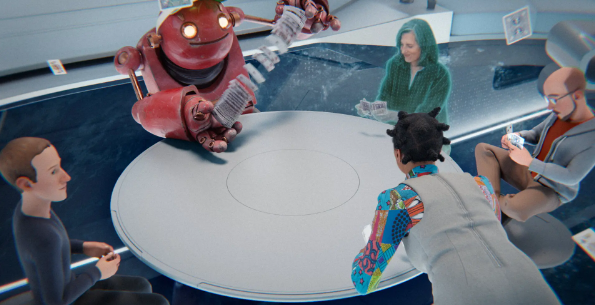The metaverse based on virtual reality eliminates the ability to “look at the other person’s face”, said Tony Fadell.
“If you put technology in between that human connection, that’s when the toxicity happens,” he said.
The metaverse is a virtual reality realm where people are expected to create avatars of themselves to interact with others in online worlds.
It will be used for gaming, but also in spaces such as work and music concerts, and is often accessed through a virtual reality headset.
Facebook co-creator and CEO Mark Zuckerberg is investing billions of dollars and hiring thousands of workers to create a metaverse.
“It becomes disintermediated and at that point you have the ability to create more trolls, people who hide behind things and then use that to their advantage to get attention.”
He added: “We need to take back control of that human connection, we don’t need more technology between us.”
Tech giant Microsoft and Epic Games, the owner of the Fortnite computer game, are also investing heavily in the metaverse.
Microsoft is adding 3D virtual environments and avatars to its Teams chat system, which is expected to go live this year.
Zuckerberg has said that the metaverse is “an embodied Internet where, instead of just viewing content, you’re in it.”
He said he told The Verge that people shouldn’t live through “shiny little rectangles” like their phones.
“A lot of the meetings we have today, you’re looking at a grid of faces on a screen. That’s not how we process things either.”
However, the metaverse has also drawn criticism and security concerns due to people’s ability to create and hide behind avatars.
Ken Kutaragi, who invented Sony’s PlayStation game console, said, “Would you rather be a polished avatar rather than your true self? That’s essentially no different from anonymous message board sites.”
Mr. Fadell said: “We had the same problem with text-based comments and with blogs, we’ve had it with video now we’re going to have it in the metaverse.”
Fadell spoke after Apple said it would discontinue the iPod Touch.
Launched 21 years ago, the portable music device revolutionized the way people listen to and store songs. Fadell also co-created the Apple iPhone.
Commenting on the end of the iPod, Mr Fa Dell said: “I’ve been in the technology business long enough to know that the pace of technology and the march of technology never ends, so it was a period of time amazing for the iPod, but unfortunately that’s the business we’re in, so I’ve gotten used to it.”
The metaverse is still in the concept stage, but the latest attempts to create virtual worlds are already facing an age-old problem: bullying.
Bloomberg tech columnist Palmy Olson told the BBC’s Tech Tent program about her own “creepy” experiences.
Meta has now announced a new feature, Personal Boundary, which will start rolling out on February 4. It prevents avatars from getting within a certain distance, which creates more personal space for people and makes it easier to avoid these unwanted interactions.
It prevents others from “invading your avatar’s personal space,” Meta said.
“If someone tries to enter their personal limit, the system will stop their forward movement when they reach the limit.”
It is available in Meta’s Horizon Worlds and Horizon Venues software.
The firm said it was a “powerful example of how virtual reality has the potential to help people interact comfortably” but acknowledged there was more work to be done.
The world beyond, Zuckerberg says in a video posted on Facebook, uses Meta’s Presence platform “to blend the physical and virtual worlds.” In this case, it’s a mix of the real world (the Meta offices) and a colorful fantasy virtual world, complete with a little blue pet monster that users can interact with. Zuckerberg virtually plays with and pets that creature, then appears to paint a virtual world onto physical walls.
Metadata helps humans tell true or false, and helps hide anything important.




